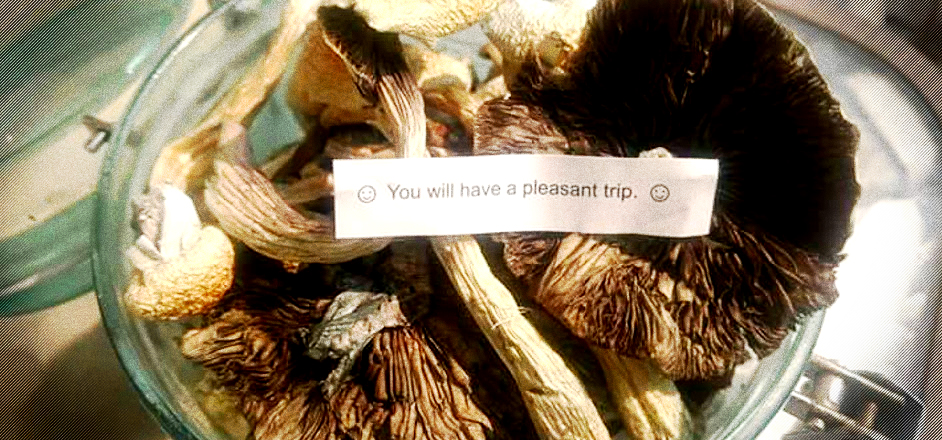A push to basically legalize psilocybin mushrooms by popular vote has gained support from a small handful of politicians and lawyers in Colorado. And the group behind it, Denver for Psilocybin, filed paperwork with the city, has a platoon of young people ready to gather the 5,000 signatures, a handful of donors and some city-wide polling.
It plans to have the issue on the city ballot in May 2019. There won't be stores for mushrooms. But, if passed, an adult in Denver — not the whole state — could feel safe, say, bringing mushrooms to a concert or taking them with a trained guide in peace.
And a small handful of politicians are willing to openly support this decriminalization.
"I've known people that have gotten off hard drugs, who have gotten through depression, who have worked through all kinds of emotional issues by using psychedelics in a responsible way," said Denver's Kayvan Khalatbari, a well-known cannabis entrepreneur who is running a close race to unseat the current mayor.
Mushrooms in Denver are not a huge issue. Cops only handed down 70 citations for mushrooms last year, compared to about 3,000 heroin busts and 4,000 for cocaine. In large doses, they're too strange, and sometimes too frightening, to be a regular recreational drug.
But about 20 million Americans have done mushrooms. And the Global Drug Survey says mushrooms carry the lowest physical risk of any recreational drug.
"Am I on board? Absolutely," said Longmont's Jonathan Singer, 39, who was one of only two state representatives who backed marijuana legalization in 2012, and says he'd like to see all drugs treated as a health issue. "It's a step in the right direction."

The enthusiasm signals a growing hope not just for an obscure drug in a mid-sized city in the middle of the country, but of larger ideas: that the early, promising studies showing psilocybin helps depression and addiction could be investigated. That microdosing could be legally and openly explored. And that cannabis might not be the only drug freed at the ballot box, city by city, maybe neighborhood by neighborhood.
The initiative doesn't just say "shrooms are legal." Instead, it mimics a 2007 Denver law that declared that cannabis should be the "lowest law enforcement priority" for cops, which effectively decriminalized cannabis in the city. The initiative also says that city funds couldn't be used to prosecute people for shrooms — another tactic borrowed from cannabis law.
"The idea was, let's look at what's been done in cannabis," said Noah Potter, a psychedelic drug policy consultant and lawyer with Hoban Law Group, a cannabis firm. Potter helped craft the mushroom initiative along with activists and mushroom lovers, and with lawyers from Vicente Sederberg, one of the nation's most prominent cannabis firms.
"I'm not aware of anything in Colorado law that would differentiate between cannabis and psilocybin mushrooms," Potter said. "It's opening an entirely new door."
Could it pass? Khalatbari's campaign has done some polling.
"It is not showing as likely to pass at this point," Khalatbari says. "But we have to keep in mind that this is prior to an educational campaign. This is prior to us, as a Denver community, having a conversation."
Facilitating that conversation will be Denver for Psilocybin, a group that boasts 50 volunteers, a board of 16 people and some inquiring major donors.
"We've brought together a really robust team to work on this," says Kevin Matthews, the campaign head, and a guy who says mushrooms helped his depression.
Rep. Singer, a lonely voice on legal weed back in 2012, seems like a weird fit to support freeing up drugs. He has never even smoked weed, let alone done mushrooms. He met his wife at the library. But as a social worker, he saw how the punishments for drugs often damaged families worse than the actual drugs. "Prohibition doesn't work," Singer said.
Khalatbari, the mayoral candidate, is a more natural voice on mushrooms. When he was younger he did some drugs he thinks set him back. But mushrooms — far from damaging him — helped. He was the co-owner of a Denver pizza shop when, on New Years Eve 2009, he tripped mushrooms with friends. An idea bubbled up to start a marijuana dispensary — then an edgy, risky move that could have landed him in jail.

"Psilocybin certainly opened up the receptors in the brain to new ideas, new thoughts," Khalatbari says.
Ten years later, the shop, Denver Relief, is the longest continually-operated pot shop in town, the consulting firm it spawned is now international, and Khalatbari sold off enough of the businesses that he now devotes himself full-time to running for mayor.
And another risky, edgy idea bubbles up from underground.



Leave a Reply